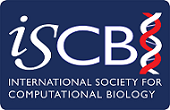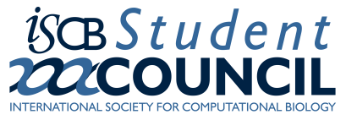
The ISCB Student Council and its Regional Student Groups are organizing the 21st Student Council Symposium (SCS), preceding ISMB/ECCB 2025 in Liverpool, UK. The Student Council Symposium is a forum for students and young researchers in the fields of Computational Biology and Bioinformatics. Participants will have the opportunity to present their work to an international audience, build a network within the computational biology community and develop important soft skills in an environment that fosters the exchange of ideas and knowledge.
Updated Programme Schedule
| Time | Session | Topic | Speaker |
| 8:30 - 8:45 AM | Opening Remarks | SCS Chairs | |
| 8:45 - 8:30 AM | Opening Keynote | Professor Segun Fatumo, Queen Mary University of London | |
| 9:30 - 9:45 AM |
Genomics and Multi-Omics Chair: Adeline McKie, Queen’s University Belfast, UK
|
Nutri-omics: how omics investigation can help designing personalized nutrition research | Dr. Mirko Treccani, University of Parma, Italy |
| 9:45 - 10:00 AM | Nocardia Genomes are a Large Reservoir of Diverse Gene Content, Biosynthetic Gene Clusters, and Species-specific Genes | Kiran Kumar Eripogu, Biodiversity Research Center, Academia Sinica, Taiwan | |
| 10:00 - 10:05 AM | Lifting the Veil on Challenging Medically Relevant Genes | Victor Grentzinger, GIGA Research Institute, Liège, Belgium | |
| 10:05 - 10:10 AM | MLCSB | AccuRate: A Tool Supporting Genotype–Phenotype Analysis and Causal Mutation Discovery in Soybean | Alžbeta Rástocká, Palacky University, Slovakia |
| 10:10 - 10:15 AM | Early colorectal cancer detection with deep learning on ultra-shallow whole genome sequencing of cell-free DNA | Ritchie Yu, McGill University, Canada | |
| 10:15 - 10:30 AM | DNA-DistilBERT: A small language model for non-coding variant effect prediction from human DNA sequences | Megha Hegde, Kingston University London, United Kingdom | |
| 10:30 - 10:45 AM | Generative AI for Childhood and Adult Cancer Research | Guillermo Prol Castelo, Barcelona Supercomputing Center, Spain | |
| 10:45 - 11:00 AM | Coffee Break | ||
| 11:00 - 11:05 AM | MLCSB | AutoPeptideML 2: An open source library for democratizing machine learning for peptide bioactivity prediction | Raúl Fernández-Díaz, IBM Research, UCD Conway Institute, Ireland |
| 11:05 - 11:10 AM | ENQUIRE automatically reconstructs, expands, and drives enrichment analysis of gene and MeSH co-occurrence networks from context-specific biomedical literature | Luca Musella, Friedrich-Alexander-Universität Erlangen-Nürnberg, and Uniklinikum Erlangen, Erlangen, Germany | |
| 11:10 - 11:15 AM | Automating Linear Motif Predictions to Map Human Signaling Networks | Yitao (Eric) Sun, McGill University, Canada | |
| 11:15 - 11:30 AM | Fold first, ask later: structure-informed function prediction in Pseudomonas phages | Hannelore Longin, KU Leuven, Belgium | |
| 11:30 - 11:45 AM | Exploring capabilities of protein language models for cryptic binding site prediction | Vít Škrhák, Charles University, Czechia | |
| 11:45 - 11:50 AM |
Proteins/RNA Chair: Dr. Tiziana Ricciardelli, King Abdullah University of Science and Technology, Saudi Arabia |
Coarse-grained and Multi-Scale Modeling of Lytic Polysaccharide Monooxygenases: Insights into Family-Specific Dynamics and Protein Frustration | Nisha Nandhini Shankar, SASTRA Deemed to be University, India |
| 11:50 - 11:55 AM | Identification and structural modeling of the novel TTC33-associated core (TANC) complex involved in DNA damage response | Małgorzata Drabko, Institute of Biochemistry and Biophysics PAS, Poland | |
| 11:55 AM - 12:00 PM | Integrative Transcriptomic Profiling Reveals Novel lncRNA–circRNA–miRNA–mRNA Regulatory Networks in a Neurohormonal Model of Cardiac Hypertrophy | Sebastián Urquiza-Zurich, Advanced Center for Chronic Diseases - ACCDiS, University of Chile, Chile | |
| 12:00 - 12:15 PM | Deep Phylogenetic Reconstruction Reveals Key Functional Drivers in the Evolution of B1/B2 Metallo-β-Lactamases | Samuel Davis, The University of Queensland, Australia | |
| 12:15 - 12:30 PM | Integrated analysis of bulk and single-nuclei RNA sequencing data of primary and metastatic pediatric Medulloblastoma. | Ana Isabel Castillo Orozco, Research Institute of the McGill University Health Center, Canada | |
| 12:30 - 12:35 PM | Multilingual model improves zero-shot prediction of disease effects on proteins | Ruyi Chen, The University of Queensland, Australia | |
| 12:35 - 12:40 PM | Meta-Analysis of Bovine Transcriptome Reveals Key Immune Gene Profiles and Signaling Pathways | Vennila Kanchana Devi Marimuthu, SASTRA Deemed to be University, India | |
| 12:40 - 12:45 PM | Functional Interfaces at Ordered–Disordered Transitions: Conserved Linear Motifs and Flanking Regions in Modular Proteins | Carla Luciana Padilla Franzotti, National University of Quilmes, Argentina | |
| 12:45 - 12:50 PM | TCRBench: A Unified Benchmark for TCR–Antigen Binding Prediction and Clustering | Muhammed Hunaid Topiwala, Biodesign Institute, Arizona State University, USA | |
| 12:50 - 12:55 PM | Investigating novel transcriptional regulators in symbiotic nodule development of Medicago truncatul | Sara Eslami, Kosar Bojnord University, Bojnourd, Iran | |
| 12:55 - 1:00 PM | Post-translational regulation of stemness under DNA damage response contributes to the gingivobuccal oral squamous cell carcinoma relapse and progression | Sachendra Kumar, Indian Institute of Science, India | |
| 1:00 - 2:00 PM | Lunch Break + Poster Session | ||
| 2:00 - 3:00 PM |
Panel Discussion Chair: Sebastián Urquiza-Zurich, Advanced Center for Chronic Diseases - ACCDiS, University of Chile, Chile |
A New Bioinformatics Era: State of Multi-Omics Data Integration |
Dr. Laura Veschetti, Università Vita-Salute San Raffaele and San Raffaele Scientific Institute Dr. H. Melike Dönertas, Leibniz Institute on Aging - Fritz Lipmann Institute Dr. Mirko Treccani, Department of Food and Drug, University of Parma, Italy |
| 3:00 - 3:45 PM |
Closing Keynote Chair: Megha Hegde, Kingston University London, United Kingdom |
Professor Dame Janet Thornton, EMBL-EBI | |
| 3:45 - 4:00 PM |
Closing Remarks |
SCS Chairs | |
Sponsors


Would you like to promote your organisation to future leaders at the most popular student symposium in Computational Biology?
Contact Us
